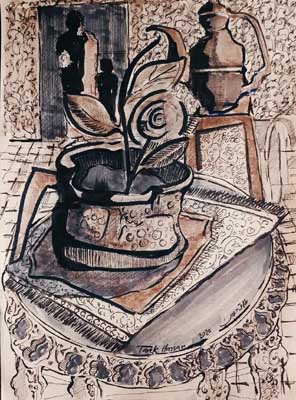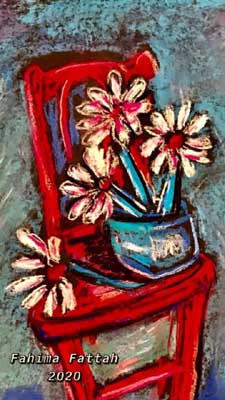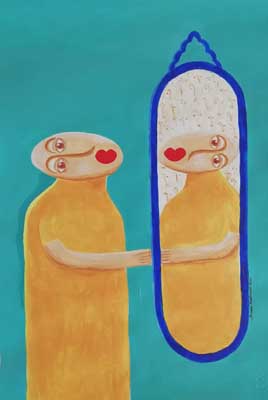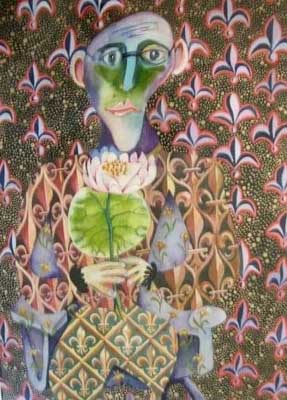Quarantine is all boredom and distress, but this need not be the case for artists who work in isolation anyway.
One Facebook initiative, Stay Home: Draw Home, endeavours to remind people of thus fact, encouraging professionals and amateurs to use their time at home to creative ends. Launched on 30 May by the celebrated London-based artist and Iraqi art collector Maysaloun Faraj and Boston-based scholar of languages and wood sculptor Shakir Mustafa, the Facebook group promotes the practise of exploring living spaces closely and anew.
By focusing on corners and details normally missed at the hectic pace of life, Stay Home: Draw Home asks each artist to produce a visual diary of this surreal historical moment.
“Like to many artists,” Faraj told me, “I did not have access to my studio due to Covid-19. Consequently, staying at home became a mission to draw my ‘home’ from every vantage point possible. In complete contrast to my usual large scale geometric abstract painting, I found myself rediscovering my drawing skills through direct observation, a practice I had not undertaken since my days as an architectural student in mid-1970s Baghdad. With a deep desire to share this experience, artists, enthusiasts and creatives were invited to make new art based on the theme of ‘home during lockdown’.

Artwork by Tarek Hassan Ali
“Initially, the idea was to connect and share a glimpse of our daily lives in self-isolation through drawings based on ‘observation’ depicting specific perspectives of our homes from the ‘inside looking in’ or the ‘inside looking out’. The theme, however, evolved to include self-portraits and more recently the broader Notion of Home.
“That was in response to one of the group’s thought-provoking works by the notable artist Ahmed Al-Bahraini. I found myself wondering, Is ‘home’ where the heart is or is it where the mind is or is it where every part of our being dwells? Do we carry it with us where we roam or is it a distant yet tangible memory of that place in which we grew, lived, loved and belonged? Is it where we feel safe, protected and loved? For those of us who are fortunate enough to have a home, it is all this and more. But for those who are not, it is beyond words. I hope to see all these notions reflected by member artists.”
Finding himself spending more time at home during quarantine, for his part, Shakir Mustafa began to think about “reimagining the physical space we occupy”. Since then he has come to notice that more women than men are participating.

Artwork by Fahima Fattah
“I have been thinking about this and can’t really find a satisfactory explanation. Perhaps men are too sensitive to share artistic works? Their fear of criticism? Or maybe their laziness? I wouldn’t say my notion of home has changed – but just reflecting on what home means has been rewarding. To look at other people’s homes and to examine their relationship with space is an imaginative processes through which one becomes part of a community. Home isn’t just where I live, but also where others live, it is where I connect with people’s physical spaces.”
This is Faraj’s second online project after Strokes of Genius: Contemporary Iraqi Art, but that, she says, was an entirely different project: “It took six years to develop and accomplish. Besides being the first online platform that brought together Iraqi artists from around the globe, it constituted a physical touring exhibition through major cities in the UK and USA (2001-2003) and a coinciding publication seen as the foremost reference on the subject, mapping Iraqi art from the beginning of the 20th century until the start of the millennium. This was followed by the establishment of the Aya gallery in London, which continues to have an online presence.”
As for the present initiative, plans to publish an online catalogue of selected works will be considered once life is back to normal: “I certainly hope that the group will continue to connect, inspire, educate and grow beyond the current restrictive circumstances that gave birth to it. Consistent diligent work paves the way for success, I believe.”

Artwork by Sondos Abdel Malak
Tens of drawings and paintings are showcased every single week. They exude a sense of intimacy and positive energy. Flowers, gardens, birds, kites, home’s intimate corners such as the study, the living room, the kitchen are warmly illustrated. Self-portraits are beautifully merged with small decorative details.
One of those self-portraits by Ron DeLong, an American artist, features a smiling man holding flowers, backdropped by wallpaper. Still life is also beautifully featured in colorful, intimate and neat paintings by Faraj herself, as well as small ink on paper sketches by Tarek Hassan.
One of the most beautiful artworks is a 120x150 cm acrylic on canvas painting by Libyan artist Najla Fitouri, featuring a group of women wearing traditional costumes and having a chat on the balcony. Another interesting painting in collage and marker by the Paris-based Syrian artist Orouba Dieb shows a woman holding her travelling bags.
Stay Home: Make Art (Budding Talents Aged 3-8) has now also been launched. All in all 858 from all over the Arab world have taken part.

Artwork by Ron de Long
“The number of participating artists has grown steadily since day one. This was totally expected as we were adamant to set a theme with specific guidelines and requirements rather than leave it completely open. Good things take time and we are happy with the progress and how the project is developing,” Faraj explained.
“My views and expectations have not changed during this unprecedented moment in our history,” Faraj says, “though perhaps some of them have been heightened as I’ve always been acutely aware of the importance of home and that deep sense of belonging. It is this sense of a shared humanity that is most captivating, moving and intriguing.
“Personally, I choose to see hope and light at the end of the tunnel. Despite the uncertainty and turmoil of today, there has been an abundance of solidarity, humanity, joy and beauty across the globe. I feel more connected not only with the present and what matters most, but also with the past, re-living treasured memories of what was once my home in Baghdad, that golden city at the heart of the cradle of civilisation. I like to think of it all as a positive outcome of these challenging times.”

Artwork by Mohammed bin Lamin
*A version of this article appears in print in the 25 June, 2020 edition of Al-Ahram Weekly
Short link: